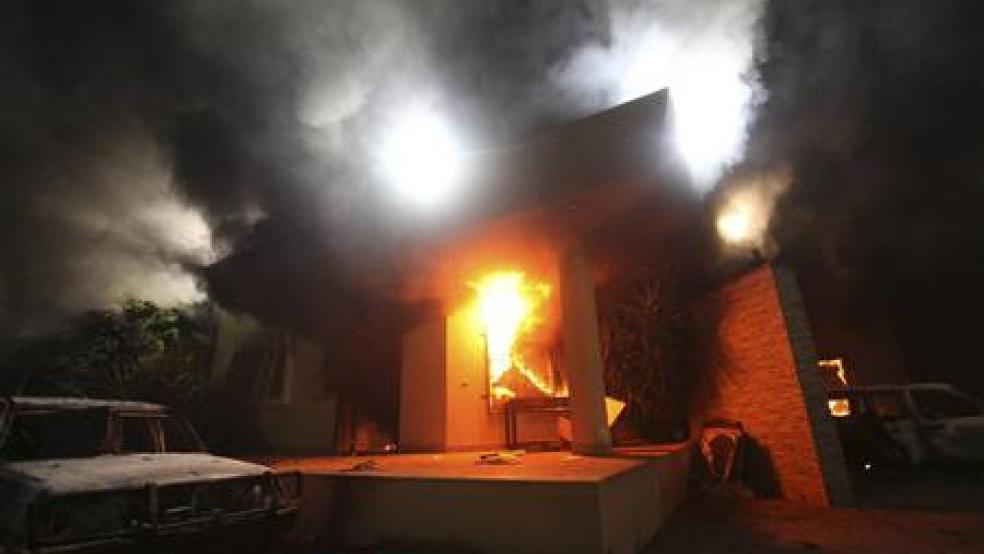Days before Hillary Clinton is due to appear in a high-profile hearing before the House committee investigating the Benghazi attacks, the panel’s top Republican is defending the committee against accusations that it is politicized, even as its senior Democrat is doing everything he can to reinforce that perception.
Rep. Trey Gowdy (R-SC), the former federal prosecutor heading the Benghazi committee, and Rep. Elijah Cummings (D-MD), the senior Democrat on the committee, made dueling appearances on CBS’s “Face the Nation” Sunday morning, and also released competing press releases challenging each other’s handling of the evidence presented to the committee.
Related: House Republicans Give Clinton Another Gift on Benghazi
Gowdy started in something of a hole, considering that he was confronted with statements made over recent weeks by Republicans in the House – Majority Leader Kevin McCarthy and Rep. Richard Hana of New York – saying that the probe was designed to cause political problems for Clinton.
“I have told my Republican colleagues and friends, ‘Shut up talking about things that you don’t know anything about,’” Gowdy told host John Dickerson. “Unless you’re on the committee, you have no idea what we’ve done, why we’ve done it, and what new facts we have found. We have found new facts, John, that have absolutely nothing to do with her. I get that people don’t want to talk about that, but the seven members of my committee are much more focused on the four dead Americans than we are anyone’s presidential aspirations.”
He went on to reveal that the committee recently got access to the email account of U.S. Ambassador Chris Stevens, who was killed in September 2012, when terrorists launched an attack on the U.S. compound in the city of Benghazi.
The Stevens emails, he argued, reveal the “total disconnect” between the crisis on the ground in Libya when Stevens took over and the State Department’s focus on how best to spin the day-to-day events there in presenting them to the public.
Related: Gowdy’s Dream of an Unsullied Committee Dashed
But the emails that have received the most attention so far haven’t belonged to Stevens, but to Clinton.
The committee has been criticized, primarily by Democrats, for its focus on Clinton’s use of a private email account for her official correspondence while secretary of state. Clinton has, in defending herself, relied on the narrow assertion that nothing “marked as classified” was ever forwarded sent through her private account.
Gowdy has consistently argued that his interest in the Clinton email scandal is limited to the light it sheds on his investigation into the Benghazi attacks.
However, despite his adamant claims that he is not overly interested in the Clinton emails, he went on at some length Sunday morning criticizing the Clinton State Department for asking Stevens to read and react to an email sent by a former Clinton advisor, Sidney Blumenthal, who exchanged numerous emails with the secretary of state prior to the attacks.
Related: Clinton Confronts Benghazi Controversy Ahead of Crucial Testimony
After Gowdy’s interview was finished, Cummings appeared immediately after and claimed that the chairman is now trying to de-politicize a committee that has been political in nature all along.
“He’s now trying to shift back to where we should have been all along,” Cummings said.
Also on Sunday, Cummings released a letter to Gowdy accusing the chairman of inaccurately reporting that Clinton had forwarded an email containing the name of a confidential Central Intelligence Agency source through her personal email account.
In an earlier 13-page letter to Cummings, which was also released publicly, Gowdy claimed that by forwarding the email through a non-government account Clinton had potentially exposed “some of the most protected information in our intelligence community, the release of which could jeopardize not only national security but human lives.”
Related: Sensing an Advantage, Clinton Skewers GOP on Benghazi Probe
Cummings replied that the CIA, in conversations with committee staff, had indicated “they do not consider the information you highlighted in your letter to be classified.” Quoting CIA officials, he said, “the State Department consulted with the CIA on this production, the CIA reviewed these documents, and the CIA made no redactions to protect classified information.”
Gowdy’s staff was quick to fire back, pointing out that the reason the CIA did not demand redactions was that document was already redacted – meaning that the classified information had already been removed -- not because the information in Clinton’s email wasn’t classified.
The performance by the two top members of the Benghazi committee on Sunday suggests that when Clinton takes her seat in front of the panel Thursday and the members of each party alternate in questioning her, observers will be at some risk of whiplash.





